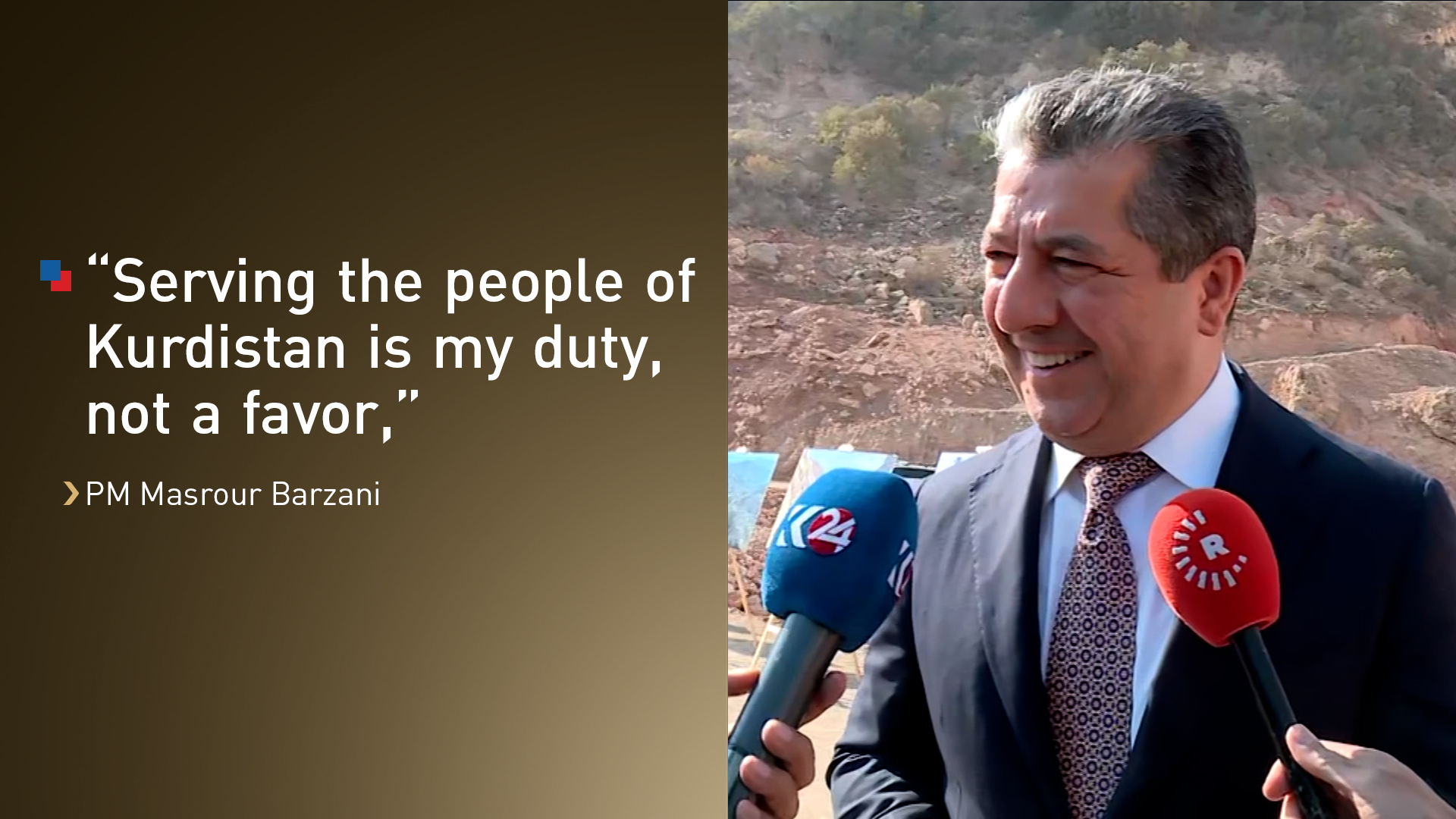Kurdistan PM Barzani: Kurdistan Salaries Have Been Politicized by Baghdad
The Prime Minister reaffirms that Erbil has met all its obligations, accusing Baghdad of using salary payments as a political tool while highlighting his government’s strategic development and water projects.

ERBIL (Kurdistan24) — Kurdistan Region Prime Minister Masrour Barzani on Thursday reiterated that his government has fulfilled all its obligations regarding public sector salaries, but that the issue has been “politicized” by Baghdad. His remarks came during a visit to the Dwin area in Erbil, where he reviewed the area’s master plan and ongoing development projects, including the construction of the Dwin Dam and the nearby historic Dwin Citadel, to review ongoing construction and preservation efforts.
Speaking to Kurdistan24 and other local media, Barzani said, “Unfortunately, the salary issue has been turned into a political matter. We have repeatedly stated that the Kurdistan Regional Government has carried out all its commitments, even going beyond what was required. Yet every time, the federal government delays the salary payments.”
He added that the KRG would continue its efforts to secure future payments as soon as possible. “We are doing everything within our means to ensure that salaries are paid. However, responsibility now lies with Baghdad,” the Prime Minister stated.
“Those who constantly complain should direct their concerns toward Baghdad, not Erbil.”
A Politicized Dispute with Deep Roots
The salary dispute has long been one of the key friction points between Erbil and Baghdad. Although both sides have signed several financial and oil agreements over the years, implementation has often stalled due to political tensions and shifting alliances in Baghdad.
Kurdish officials argue that the federal government has repeatedly failed to transfer the Region’s fair share of the national budget, using salary payments as leverage in political negotiations.
The Kurdistan Regional Government (KRG) maintains that it has fulfilled all legal and technical requirements for funding disbursements, including submitting payroll lists and complying with federal auditing procedures.
For the KRG, the issue is not administrative but political — a reflection of a broader struggle over autonomy, constitutional rights, and fair treatment within the federal framework.
Strategic Development and Commitment to Serve the People
During his visit to Dwin, Prime Minister Barzani also highlighted the strategic importance of the Dwin Master Plan, which includes key infrastructure, environmental, and tourism projects.
The plan is centered around the Dwin Dam — a major project under construction — designed to store 100 million cubic meters of water and play a vital role in irrigation, groundwater preservation, and local economic development.
“The Dwin Master Plan is important in every respect,” Barzani said. “It not only strengthens our water management system but also preserves the environment and revitalizes a region rich in historical and tourism value.”
He noted that the Dwin Dam will have a “positive environmental impact and play an essential role in water conservation,” describing it as a strategic response to the challenges of climate change and water scarcity in Kurdistan.
Under the ninth cabinet, Barzani’s government has made dam construction and water management central to its long-term strategy. Several major dams and reservoirs are being developed to support agriculture, safeguard groundwater, and promote sustainable rural growth.
The initiative also aligns with broader plans to diversify the economy and reduce dependency on oil revenues.
In his closing remarks, Prime Minister Barzani reaffirmed that serving the people of Kurdistan remains his government’s foremost priority.
“Serving the people of Kurdistan is my duty, not a favor,” he said. “This is a trust I hold on behalf of our citizens, and I will never see it as a burden. My job is to serve — and let others do the talking if they wish.”
Barzani’s message underscored his administration’s determination to continue delivering public services and infrastructure despite financial pressures and political obstacles.
His emphasis on both resilience and reform reflects a broader vision: a self-reliant, developed, and dignified Kurdistan that refuses to let political disputes undermine the well-being of its citizens.